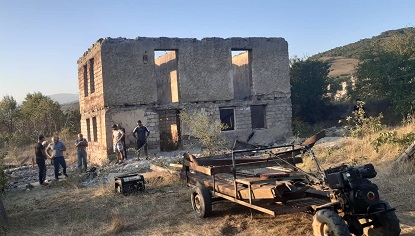Lado Bitchashvili, Shida Kartli
While the occupant forces were constructing the banners indicating at the so-called border in Gugutiantkari village, local Givi Razmadze was dismantling his own house because the representatives of the occupation regime told him his house was now in the occupied territory and he could no longer live there. The occupants gave three days to him to take the construction materials and other items from his estate.
“I am taking what is left there. What else can I do? Shall I allow them take all what I created during my life? I had only that house and now they are taking it too,” Givi Razmadze said, whose house is one of those three, which will turn up in the newly occupied territory in Gugutiantkari.
The locals said besides those three houses, part of agricultural plots and headwaters of the drinking water will turn up in the occupied territory. They said they feel unsafe and request the Government of Georgia to take effective measures to stop creeping occupation.
“We want to tell the world about our daily tragedies. I was hostage; they beat me with Russian boots; I was tortured but never abandoned the village. I will not leave it now either but what shall I tell my children and grandchildren? Let the world hear our voice. I cannot take my grandchildren into the burnt house,” said one of the locals during her conversation with Ketevan Tsikhelashvili, the State Minister for Reconciliation and Civic Equality.
Tsikhelashvili arrived in Gugutiantkari on August 16 together with the ambassadors and representatives of the diplomatic corps accredited in Georgia.
“Today, I arrived here together with the ambassadors and representatives of the diplomatic corps. They will personally see what is happening in Georgian villages, what the occupation regime is doing here and how they act against individuals,” Tsikhelashvili said.
In the evening of August 16, the Minister of Foreign Affairs of Georgia stated at the press-conference that the occupation regime stopped so-called border demarcation activities in Gugutiantkari and he explained it with the consecutive steps taken by the state and support of the international diplomats.
“First official statement was made on August 7. The Ministry of Foreign Affairs invited representatives of the diplomatic corps and they received detailed information about ongoing illegal process. On August 8, the Georgian side raised the issue with the UN Security Council. It is the highest tribune, from where we requested our partners to pay particular attention to the ongoing borderization process in the occupied territory. On the same day, the US State Department made respective statements with regard to illegal actions. On August 7, 8 and 9 we activated two-sided channels to hear the evaluations of the process from all capitals. Of course, all was done with intensive work and efforts of the Ministry of Foreign Affairs,” said the Minister Davit Zalkaniani.
Representatives of the occupation regime started installment of the so-called border banners in Gugutiantkari on August 7. After the GoG protested the process, they suspended the works during several days but then resumed on August 14.
News
December 13, 2023
Ethnic minorities outside the peace dialogue
November 6, 2023
‘Peace’ agenda of political parties
Popular
Articles
February 13, 2024




